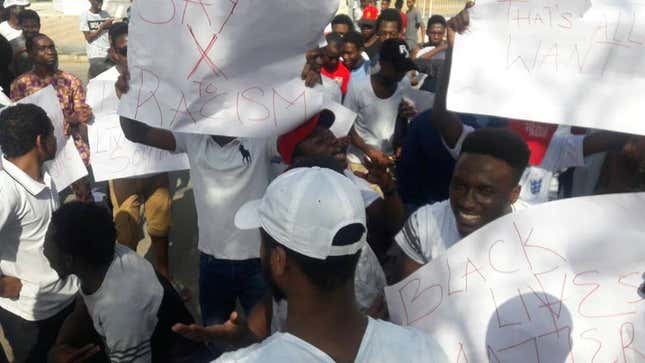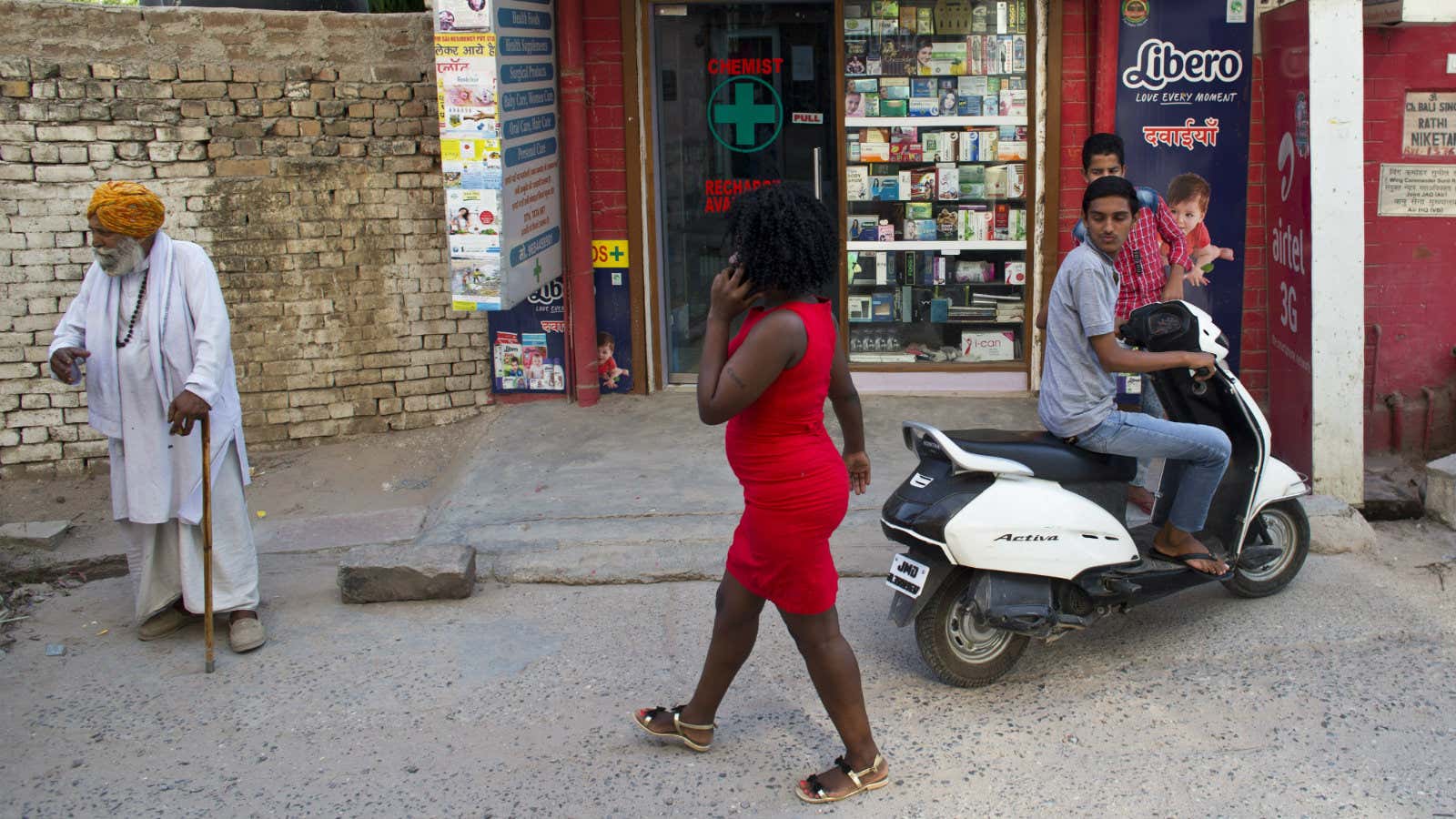Amina looked down from the eighth floor of the pristine Greater Noida residential building, around 40 km from New Delhi. Everything looked normal from this height—the blazing hot afternoon was finally receding, the fountain had been turned on and children were venturing outside, clutching bats and badminton rackets. Her brothers were home, knocked out by the afternoon heat, but soon they would be awake and hungry again. This was their third day at home, and provisions were running low.
On Friday, March 24, an Indian teenager had gone missing in the neighbourhood, spelling trouble for Amina and other members of the small community of people from various parts of Africa who live and study in Greater Noida’s famous education hub. Since Saturday, several African students have been brutally attacked by mobs claiming that people from Nigeria are disproportionately involved in the narcotics trade. Bizarrely, a rumour got around that Nigerian students were cannibals who had eaten up the teenager. Protestors took to the streets on Monday demanding that all Africans leave the Greater Noida area.
By Wednesday, Amina had hoped the matter had settled down. But that morning, a Kenyan woman was dragged out of her cab and attacked by locals. Sharda University, of which Amina was a student, had offered asylum and transport to all the African students until matters cooled down. But Amina was loathe to leave her brothers alone at home. The boys, who study at another international school in Greater Noida, were friends with one of the young Nigerian men who was beaten up at Pari Chowk on Monday, and she’d already caught them trying to join a peaceful protest against the mob violence once.
Amina looked at the sparse apartment, furnished with a single rug, a mattress in each room and now, an empty fridge. “How did we get here?” she said.

A premium experience
The brochures looked incredible: red-brick classrooms, manicured lawns strewn with cosmopolitan students strumming acoustic guitars. At an education fair at Amina’s college in Nigeria, the Indian recruitment agent said all the right things: the largest international faculty of any Indian university. Multi-disciplinary, integrated courses. Visa, accommodation, and cultural integration would all be the university’s responsibility, the agent said. All she needed to do was sign up for what promised to be a great adventure.
In 2013, Amina was living in a small town in Nigeria, with five siblings and her mother. She had studied history in college, but wanted to become a journalist. Nigeria’s media industry was growing, and Amina was a confident, attractive, intelligent young woman—perfect for television.
Nigeria has a large and vibrant Indian community. The country is India’s largest trading partner in Africa, and Indian-owned and -managed industries are the largest employers in the country after the federal government. Amina and her friends already knew and loved Indian food, clothes, films, and music. Her cousins had learnt Hindi by simply watching Bollywood films. How hard could it be, she thought.
She signed up, and in 2014, Amina landed at the Indira Gandhi International Airport in New Delhi and took the long cab ride past South Delhi’s busy streets, Noida’s malls, cinema halls, and crowded eateries, out into the empty farmland of Greater Noida, to the gates of Sharda University.
If Chandni Chowk’s picturesque crowds, Goa’s beach parties, and Rajasthan’s feudal havelis once represented India’s airbrushed face to Europeans in search of colonialism’s lost worlds; Greater Noida’s identical glass-and-marble buildings signalled comfort for a different kind of visitor: the medical tourist in search of a cheap operation, the global investor looking for opportunities, the international student in search of a better education that the one currently offered in Addis Ababa, Khartoum, Kampala, or Lagos.
In her book Urban Villager: Life in a Satellite Town, Vandana Vasudevan describes Greater Noida’s transformation into an “education hub.” In the hope that the metro would soon expand beyond Delhi, even beyond Noida, big builders (except the Ansals who rule Gurgaon) began to buy land in Greater Noida, turning it into a city of gated low rises, high rises, and private villas.
When the All India Council for Technical Education, a regulatory body under the ministry of human resource development, gave licences indiscriminately and at low costs to anyone who wanted to set up institutes for research and education, property agents and businessmen began building schools and universities. These were run exactly like businesses: cost-cutting meant the faculty are often chosen from a local pool, the quality of education was less important than the enrolment numbers, and enrolment was ensured both by a rapidly expanding set of courses on offer (Sharda, for instance, offers classes in architecture, law, mass communication, medicine, biotechnology, engineering, management, languages, and theatre), and highly-paid recruitment agents who travelled to countries with first-generation students and English speakers, easy targets for “a premium international experience.”
But not all the students are satisfied with what they find. That is obvious from these two videos, one made by the university and the other by students: “Sharda: Where the world is” and “Sharda: Why the world is here?”
Soon after she first came to Sharda, Amina discovered that Indian campuses liked to infantilise female students under the guise of “protection”—an experience familiar to most young women in Indian hostels. If she wasn’t in the hostel by 8pm, she was expected to “find her own accommodation for the night.” If she was, she would be locked in, until the hostel guards released the women from their temporary cages every morning—all of this heightened by the fact that unlike most Indian girls, Amina couldn’t just crash at a friend’s place. Her classmates from African countries were at the mercy of similar whims from landlords and hostel wardens, her Indian friends who still lived with parents didn’t know how to explain bringing a black woman home.
Her experience was similar to those of most international students enrolled in any one of India’s many new multi-disciplinary, international higher education institutes, like the Acharya Institutes at Soldevanahalli outside Bengaluru, or the campus of Lovely Public University on the Jalandhar-Phagwara highway. Everywhere, students would find themselves presented with two options—campus housing (which usually meant restrictive timings, terrible food, and behavioural policing) or renting homes in the palatial but semi-deserted housing colonies near the college. On campus, life was limited. Outside it, in the jungle of the vast peri-urban (chosen to accommodate equally vast campuses), it was dangerous.
Life on the edges
Near Sharda University, adjacent to Greater Noida’s four Knowledge Parks, are mid-range high rises with names like Vista, Panorama, Springfield, Crescent or Boulevard Heights. A marble-tiled, but otherwise ordinary, five-bedroom flat is rented out for anything between Rs19,000 and Rs24,000 (the rates are hiked for students from African countries). The apartment complex offers additional services like security guards who speak a smattering of English, CCTV cameras, gymnasiums, a provisions store, a plant to purify Greater Noida’s notoriously hard water and a swimming pool (which Amina does not use—the one time she tried, the pool emptied out in seconds, leaving her alone in the water). The residential complexes are so designed that you rarely have to leave them—to disguise the fact that if you were to actually leave, you’d be stranded for some distance, without public transport, amenities, food or help.
”I’ll die if I have to live here any longer,” Helen, a B.Com student from Lovely Public University in Jalandhar said over the phone. A year after she first arrived at Lovely, Helen, who was living in the men’s hostel, decided she had to come out—both to her parents in Zambia and to the university. When her parents stopped speaking to her and Lovely refused to give her a room in the women’s hostel, she left the campus to find a safer home. Outside, she learnt that being a black trans-woman was like walking around with a target painted on your back.
“One night, a man I had gone for dinner with came to my apartment asking for a glass of water,” she said. “When I turned around to bring it to him, he locked the door and tried to rape me. I convinced him that I would co-operate if he stopped hitting me. As soon as he let me go, I ran out to find the police. They took one look at me—barefoot, torn clothes, black, trans…she’s a prostitute, they said, trying to ruin some Indian’s reputation.”
Helen rarely ventures too far from the campus anymore. She spent a month in Delhi, where she said she lived frozen in fear, watching the door at all times. At the centre of Jalandhar, she said men follow her, try to touch her, and “mimic Hindi film stalkers.” She recalled: “I’ve had men show up at the door of my house well past midnight, saying they saw me somewhere. That’s all. Seeing me outside was enough provocation to invade my space.”
Amina, who rarely travels outside the Greater Noida-Noida-East Delhi triangle, decided to venture out when her cousin sisters were visiting last month, and booked a hotel room for the family in East of Kailash. When they arrived at the hotel, they were informed there were no vacant rooms.
“I showed him my booking, but he just kept saying no, no, go away,” she said. “We heard him tell another guy—‘I don’t like these kind of people, I don’t let them take rooms’ in Hindi. I told him ‘Your language is not so difficult to understand, you know, this is not right man’ and walked out.”
Amina insists her experiences in India are not “all bad,” but often, recounting an incident like the one at East of Kailash, or when her neighbours in Greater Noida accused Nigerians of cannibalism, she blinks back tears, shaking her head gently as though she cannot quite believe what she is narrating. Her experience of Delhi excludes all that is best about it—occasional green oases, old monuments, spectacular arrays of food, bookstores and retail.
“I saw Khan Market and Chandni Chowk once,” she said, “I was in a car, I passed by.”
Like Helen, Amina agreed that policemen were the last people one could approach for help, especially if you were black. “I realised soon after I came here, Indians are more nationalistic than anything else. If you say anything, like hey, why is this guy following me, they still take it like an insult to their country.”
However, in some ways, places like Greater Noida or the Jalandhar-Phagwara highway offer a small sanctuary, because of their insistence on becoming hubs for international students. In Greater Noida’s Janta Market, Amina has found a beauty parlour that knows how to braid her hair, a shop that stocks basic ingredients for Nigerian food, and a tailor who has learnt to make her traditional wrap-dress, cutting out matching patterns for headscarves.
“For whatever reason, even if it’s just that we pay fees and rent, people around here try to hide their racism,” she said.
This year, Helen and Amina will both graduate, and move on to the next uncertain chapters of their lives. The only thing they are certain of, they said, was that they would warn other black students to stay far away from India. Many students in Greater Noida, Amina said, were already buying one-way tickets to go home midway through the term.
“Who knows if I make it to graduation,” Amina smiled. “If I don’t…or if I have to stay here longer, I will just leave the course and run. The only thing is, what will happen to my brothers?”
The question hung in the air as her brothers shuffled out of their rooms, nodding in greeting and looking around the bare kitchen. It was evening, soon it would be time for dinner. It wasn’t safe to go out yet. “We have bread and sugar,” Amina said, opening the fridge. “We’ll manage.”
This post first appeared on Scroll.in. We welcome your comments at [email protected].
